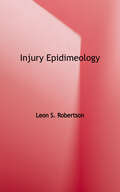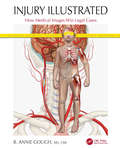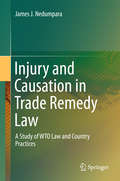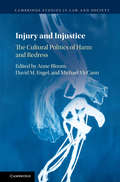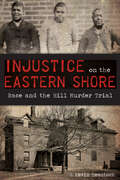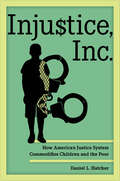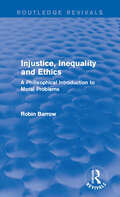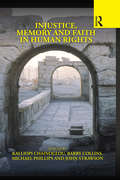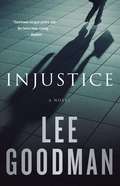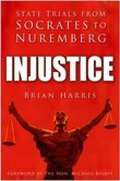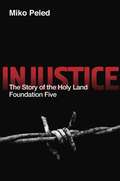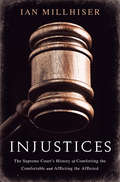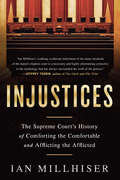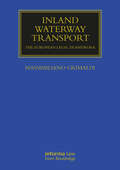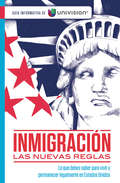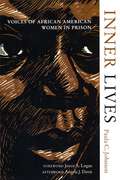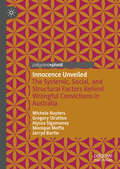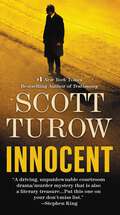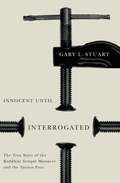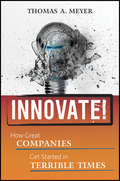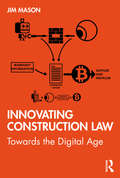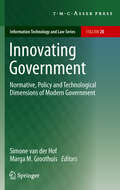- Table View
- List View
Injury Epidemiology: Fourth Edition
by Leon S. RobertsonResearch on injuries is a high priority to inform public policy that reduces deaths, hospitalizations and associated costs. Principles for research design and analysis of injury incidence and severity are emphasized. Review of extant surveillance data reveals numerous flaws that must be changed to increase usefulness of the data. Research designs of studies of injury causation and evaluation of countermeasures are often inappropriate and mislead analytic and injury control efforts. Appendices to chapters illustrate research projects that influenced public policy affecting the reduction of motor vehicle fatalities per population by half in the U.S. The principles illustrated by these studies can be applied to other types of injury.
Injury Illustrated: How Medical Images Win Legal Cases
by R. Annie GoughThe best storytellers and presenters know that a picture is worth a thousand words. Pictures simplify stories. They make stories memorable. They clarify complex concepts and they educate the audience in the easiest way. That is why attorneys work with artists—medical illustrators, to be exact. Injury Illustrated is the first book of its kind. It is the essential guide on medical illustrations used in the legal context. This book examines the creation of visual graphics known as demonstrative exhibits. These exhibits provide an understanding of traumatic injuries, surgeries, and radiology studies for the jury, judges, adjustors, mediators, and the attorneys. These chapters describe how to tell a clear story about gross anatomy, medical malpractice, and/or death investigation in court by using medical images. While medical illustration and injury law are very different professions, illustrators are the ideal partners for lawyers when solving problems and preparing for litigation. Divided into five sections, this book details who medical illustrators are, how they are educated in medicine, the skills and services they can provide to trial lawyers, and the countless benefits resulting from record review and case preparation. Find techniques to best use medical images during all stages of litigation Learn how graphic exhibits engage a jury and empower justice Understand why attorneys win more cases by collaborating with medical illustrators All readers will learn about this unique career and the attorney-illustrator relationship. More specifically, attorneys, artists, animators, law students, medical students, forensic scientists, and medical experts will understand how demonstrative exhibits assist legal proceedings in forensic matters and civil lawsuits. Warning; these images will be graphic and the cases at times will be catastrophic.
Injury and Causation in Trade Remedy Law
by James J. NedumparaThis book addresses injury and causation issues in the context of antidumping, countervailing duty (CVD) and safeguard investigations that are covered under the WTO. The book traces the origin and the negotiating history of injury and causation in trade remedy instruments and examines how this requirement evolved in the United States and more specifically in the GATT as part of the Kennedy Code, the Tokyo Codes and later the Uruguay Round negotiating texts. The book demonstrates that terms such as "principal cause," "substantial cause" and "a cause in and of itself" are not necessarily warranted in such instruments. In the light of the experiences of key users of trade remedy instruments and the WTO Doha Round Rules negotiations, the book argues that causation determination does not require mathematical precision. Econometric or quantitative tools may be suggested, but such tools need not undermine the policy-laden nature of trade remedy instruments. Accordingly, the book suggests the use of weak-necessity and strong sufficiency test as a potentially viable causative framework with regard to injury and causation in trade remedies.
Injury and Injustice: The Cultural Politics of Harm and Redress (Cambridge Studies in Law and Society)
by David M. Engel Anne Bloom Michael McCannThis book addresses some of the most difficult and important debates over injury and law now taking place in societies around the world. The essays tackle the inescapable experience of injury and its implications for social inequality in different cultural settings. Topics include the tension between physical and reputational injuries, the construction of human injuries versus injuries to non-human life, virtual injuries, the normalization and infliction of injuries on vulnerable victims, the question of reparations for slavery, and the paradoxical degradation of victims through legal actions meant to compensate them for their disabilities. Authors include social theorists, social scientists and legal scholars, and the subject matter extends to the Middle East and Asia, as well as North America.
Injustice on the Eastern Shore: Race and the Hill Murder Trial (True Crime)
by G. Kevin HemstockLynching rumors simmered as journalists descended on the small town of Millington, Maryland, in the spring of 1892. The frenzy focused on nine African American men and boys--some as young as fifteen--accused of murdering Dr. James Heighe Hill, who was white. Prosecutors portrayed this as retribution for the Christmas Eve slaying of Thomas Campbell, an African American, for which no one faced criminal charges. Hill's alleged assailants were tried as a group before three white judges. Although some were clearly bystanders, all but one were convicted and sentenced. Four were executed by hanging, and the rest died in prison. Using court records, contemporary accounts and newspapers, author G. Kevin Hemstock narrates the tragic and compelling story of justice denied on Maryland's Eastern Shore.
Injustice, Inc.: How America's Justice System Commodifies Children and the Poor
by Daniel L. HatcherAn unflinching exposé of how the family, juvenile, and criminal justice systems monetize the communities they purport to serve and trap them in crushing poverty Injustice, Inc. exposes the ways in which justice systems exploit America's history of racial and economic inequality to generate revenue on a massive scale. With searing legal analysis, Daniel L. Hatcher uncovers how courts, prosecutors, police, probation departments, and detention facilities are abandoning ethics to churn vulnerable children and adults into unconstitutional factory-like operations. Hatcher reveals stark details of revenue schemes and reflects on the systemic racialized harm of the injustice enterprise. He details how these corporatized institutions enter contracts to make money removing children from their homes, extort fines and fees, collaborate with debt collectors, seize property, incentivize arrests and evictions, enforce unpaid child labor, maximize occupancy in detention and "treatment" centers, and more. Injustice, Inc. underscores the need to unravel these predatory operations, which have escaped public scrutiny for too long.
Injustice, Inequality and Ethics: A Philosophical Introduction to Moral Problems (Routledge Revivals)
by Robin BarrowAbortion, distribution of wealth, civil disobedience, reverse discrimination, sex-role stereotyping, censorship – what does philosophy have to contribute to these practical moral issues? In this important book, first published in 1982, Robin Barrow argues convincingly that the capacity to make fine conceptual discriminations is crucial to an informed response to such issues, and he alerts us to the degree to which this ability has been lacking in much previous philosophical thought. The author presents a series of formidable arguments regarding the more controversial social and moral issues of our time, and in doing so he gives the general reader and the student of philosophy a clearer appreciation of the nature of the philosophical contribution.
Injustice, Memory and Faith in Human Rights
by Michael Phillips Kalliopi Chainoglou Barry Collins John StrawsonThis multi-disciplinary collection interrogates the role of human rights in addressing past injustices. The volume draws on legal scholars, political scientists, anthropologists and political philosophers grappling with the weight of the memory of historical injustices arising from conflicts in Europe, the Middle East and Australasia. It examines the role of human rights as legal doctrine, rhetoric and policy as developed by states, international organizations, regional groups and non-governmental bodies. The authors question whether faith in human rights is justified as balm to heal past injustice or whether such faith nourishes both victimhood and self-justification. These issues are explored through three discrete sections: moments of memory and injustice, addressing injustice; and questions of faith. In each of these sections, authors address the manner in which memory of past conflicts and injustice haunt our contemporary understanding of human rights. The volume questions whether the expectation that human rights law can deal with past injustice has undermined the development of an emancipatory politics of human rights for our current world.
Injustice: A Novel
by Lee GoodmanFrom the author of the "stellar" (Publishers Weekly) Indefensible comes a thrillingly taut legal mystery and courtroom drama that inhabits the blurry boundary between guilt and innocence when murder sends one family's life into a tailspin.Someone close to Nick Davis is murdered. Investigators see it as either a case of mistaken identity or the work of a jealous fiancé. As a federal prosecutor, Nick tries shepherding the case to a swift conclusion, but it keeps slipping away. Meanwhile, Nick's relationship with his wife, Tina, hangs by the thinnest of threads. She is also a lawyer, working to vindicate a young man convicted of killing a child eight years previously. When old DNA evidence is uncovered in the murder case, its analysis hurls Nick's universe into upheaval--his most basic assumptions about his life, the law, and the people he loves most are thrown into question. "Compelling" with "language that sings," Lee Goodman's latest novel is a truly "outstanding" page-turner (William Kent Krueger, New York Times bestselling author).
Injustice: State Trials from Socrates to Nuremberg
by Brian Harris Michael BeloffTo a lawyer, injustice is the unfair conduct of a trial. This book looks into several notorious cases of supposed injustice, Socrates, Joan of Arc, Charles I, Admiral Byng, Lord Haw-Haw, and the Nuremberg Trials. It looks for answers to the legal question 'was the trial fair?', and the humane question 'was the accused guilty or innocent?'.
Injustice: The Story of the Holy Land Foundation Five
by Miko Peled<p>In July 2004, federal agents raided the homes of five Palestinian-American families, arresting the five dads. The first trial of the "Holy Land Foundation Five" ended in a hung jury. The second, marked by highly questionable procedures, resulted in very lengthy sentences--for "supporting terrorism" by donating to charities that the U.S. government itself and other respected international agencies had long worked with. <p>In 2013, human rights activist and author Miko Peled started investigating this case. He discussed the miscarriages of justice with the men's lawyers and heard from the men's families about the devastating effects the case had on their lives. He also traveled to the remote federal prison complexes where the men were held to conduct deep interviews. Injustice traces the labyrinthine course of this case, presenting a terrifying picture of governmental over-reach in post-9/11 America.</p>
Injustices
by Ian MillhiserFew American institutions have inflicted greater suffering on ordinary people than the Supreme Court of the United States. Since its inception, the justices of the Supreme Court have shaped a nation where children toiled in coal mines, where Americans could be forced into camps because of their race, and where a woman could be sterilized against her will by state law. The Court was the midwife of Jim Crow, the right hand of union busters, and the dead hand of the Confederacy. Nor is the modern Court a vast improvement, with its incursions on voting rights and its willingness to place elections for sale. In this powerful indictment of a venerated institution, Ian Millhiser tells the history of the Supreme Court through the eyes of the everyday people who have suffered the most from it. America ratified three constitutional amendments to provide equal rights to freed slaves, but the justices spent thirty years largely dismantling these amendments. Then they spent the next forty years rewriting them into a shield for the wealthy and the powerful. In the Warren era and the few years following it, progressive justices restored the Constitution’s promises of equality, free speech, and fair justice for the accused. But, Millhiser contends, that was an historic accident. Indeed, if it weren’t for several unpredictable events, Brown v. Board of Education could have gone the other way. In Injustices, Millhiser argues that the Supreme Court has seized power for itself that rightfully belongs to the people’s elected representatives, and has bent the arc of American history away from justice.
Injustices
by Ian MillhiserFew American institutions have inflicted greater suffering on ordinary people than the Supreme Court of the United States. Since its inception, the justices of the Supreme Court have shaped a nation where children toiled in coal mines, where Americans could be forced into camps because of their race, and where a woman could be sterilized against her will by state law. The Court was the midwife of Jim Crow, the right hand of union busters, and the dead hand of the Confederacy. Nor is the modern Court a vast improvement, with its incursions on voting rights and its willingness to place elections for sale. In this powerful indictment of a venerated institution, Ian Millhiser tells the history of the Supreme Court through the eyes of the everyday people who have suffered the most from it. America ratified three constitutional amendments to provide equal rights to freed slaves, but the justices spent thirty years largely dismantling these amendments. Then they spent the next forty years rewriting them into a shield for the wealthy and the powerful. In the Warren era and the few years following it, progressive justices restored the Constitution’s promises of equality, free speech, and fair justice for the accused. But, Millhiser contends, that was an historic accident. Indeed, if it weren’t for several unpredictable events, Brown v. Board of Education could have gone the other way. In Injustices, Millhiser argues that the Supreme Court has seized power for itself that rightfully belongs to the people’s elected representatives, and has bent the arc of American history away from justice.
Injustices: The Supreme Court's History of Comforting the Comfortable and Afflicting the Afflicted
by Ian MillhiserNow with a new epilogue.Few American institutions have inflicted greater suffering on ordinary people than the Supreme Court of the United States. Since its inception, the justices of the Supreme Court have shaped a nation where children toiled in coal mines, where Americans could be forced into camps because of their race, and where a woman could be sterilized against her will by state law. The Court was the midwife of Jim Crow, the right hand of union busters, and the dead hand of the Confederacy. Nor is the modern Court a vast improvement, with its incursions on voting rights and its willingness to place elections for sale.In this powerful indictment of a venerated institution, Ian Millhiser tells the history of the Supreme Court through the eyes of the everyday people who have suffered the most from it. America ratified three constitutional amendments to provide equal rights to freed slaves, but the justices spent thirty years largely dismantling these amendments. Then they spent the next forty years rewriting them into a shield for the wealthy and the powerful. In the Warren era and the few years following it, progressive justices restored the Constitution's promises of equality, free speech, and fair justice for the accused. But, Millhiser contends, that was an historic accident. Indeed, if it weren't for several unpredictable events, Brown v. Board of Education could have gone the other way.In Injustices, Millhiser argues that the Supreme Court has seized power for itself that rightfully belongs to the people's elected representatives, and has bent the arc of American history away from justice.
Inland Waterway Transport: The European Legal Framework (Maritime and Transport Law Library)
by Massimiliano GrimaldiThis book analyses the European legal framework on inland water transport in light of the most recent legislation adopted and how the main Member States of Central Western Europe have implemented it. Specifically, the book provides an innovative tool of analytical and systematic study of the various legislative EU measures that regulate the inland waterways transport sector, as well as for the comparative study and analysis of the relevant measures of implementation adopted by the afore-mentioned Member States. Each EU legislative measure is first explained in general terms and then commented on in detail with a specific analysis of the most significant articles, following a precise logical sequence of the topics; the corresponding national implementing measures are also examined in detail* describing any different ways of transposing the EU regulation, also with regard to any differences in approach by the Member States relative to the possibility of any derogations or exemptions from compliance with some measures, which is often provided for by the EU regulation. This approach is significantly useful for (i) a more systematic and user-friendly understanding of the EU regulatory framework, (ii) an equally better understanding of how EU measures have been transposed into national legislation and (iii) a revision of this European and domestic legislation, where appropriate. Furthermore, the book is very useful for policy-makers of countries that are not members of the European Union (i.e. policy-makers from countries worldwide that have inland waterways), as they will have a reference tool to evaluate the possibility of reviewing their own regulation with a view to making it more similar to the EU one should the latter be better. While preparing the book, analyses of the preparatory work of the legislation played a great role, as they are very useful for better understanding the legislative initiatives and the reasons for the choices made. Analysis of the doctrine and jurisprudence also played a great part. This allows the reader to have a thorough understanding of the subject from a scientific point of view and from the point of view of practical application.
Inmigración. Las nuevas reglas. Guía de Univision
by UnivisiónTodo lo que un inmigrante debe conocer para vivir legalmente en Estados Unidos Inmigrar a Estados Unidos tiene nuevas reglas: Un gobierno que quiere imponer leyes más estrictas, amenaza de deportación, falsa información, estafas, miedo. Todo ha complicado la situación del inmigrante. Por eso Univision te brinda los recursos y los consejos para que puedas enfrentar la nueva realidad que estamos viviendo. En esta guía, los expertos en inmigración de Univision, el abogado Armando A. Olmedo y el editor principal de inmigración Jorge Cancino, te explican claramente varios aspectos que todo inmigrante debe saber: o Cómo funciona el proceso migratorio de Estados Unidos o Las principales visas para entrar al país de visita o para trabajar o Qué es asilo y refugio y quiénes pueden acogerse a ellos o Cómo obtener la residencia o Cómo convertirte en ciudadano americano o Legal o ilegal: Qué debes hacer ante la nueva realidad o Cuáles son tus deberes y derechos como inmigrante Con un texto informativo, claras ilustraciones, datos precisos y casos reales, Inmigración, las nuevas reglas es la guía de Univision que te acompañará en tu proceso de inmigración, desde que dejas tu tierra hasta que vives el sueño americano.
Inner Lives: Voices of African American Women In Prison
by Paula JohnsonAn intimate collection of African American women's voices on their lives in prisonThe rate of women entering prison has increased nearly 400 percent since 1980, with African American women constituting the largest percentage of this population. However, despite their extremely disproportional representation in correctional institutions, little attention has been paid to their experiences within the criminal justice system.Inner Lives provides readers the rare opportunity to intimately connect with African American women prisoners. By presenting the women's stories in their own voices, Paula C. Johnson captures the reality of those who are in the system, and those who are working to help them. Johnson offers a nuanced and compelling portrait of this fastest-growing prison population by blending legal history, ethnography, sociology, and criminology. These striking and vivid narratives are accompanied by equally compelling arguments by Johnson on how to reform our nation's laws and social policies, in order to eradicate existing inequalities. Her thorough and insightful analysis of the historical and legal background of contemporary criminal law doctrine, sentencing theories, and correctional policies sets the stage for understanding the current system.
Innocence Unveiled: The Systemic, Social, and Structural Factors Behind Wrongful Convictions in Australia
by Gregory Stratton Michele Ruyters Alyssa Sigamoney Monique Moffa Jarryd BartleThe book examines the unique dynamics surrounding wrongful convictions, particularly in Australia. Transcending the established understanding of wrongful conviction that emerged from the US innocence movement, the book provides a holistic insight into errors in the Australian justice and legal systems that lead to acknowledged and legally unacknowledged errors. Built upon the experiences of the country&’s innocence projects, the book moves beyond the established causal factors recognized in the international experience of wrongful conviction to highlight structural and systemic elements that contribute to miscarriages of justice around the world. By offering a global perspective on the struggles of the wrongfully convicted, the book provides a nuanced discussion of why the innocent are convicted of crimes they did not commit and why overturning these errors is increasingly complex and difficult, and more so outside of America. It also presents the risk of wrongful conviction from the perspective of innocence project practitioners who work with cases that can progress through appeal structures and those that unfortunately do not meet the requirements despite evidence of their client&’s innocence. Overall, the book expands discussions of what factors contribute to wrongful conviction to support more advocacy, research, and policy reform across legal and justice systems.
Innocent
by Scott TurowThe sequel to the genre-defining, landmark bestseller Presumed Innocent, Innocent continues the story of Rusty Sabich and Tommy Molto who are, once again, twenty years later, pitted against each other in a riveting psychological match after the mysterious death of Rusty's wife. Twenty years have passed since Rusty Sabitch was on trial for the murder of his lover. Now, in this long-awaited sequel to "Presumed Innocent," Sabitch's wife has just died under mysterious circumstances, and Sabitch turns to Tommy Malto for help once again.
Innocent Until Interrogated: The True Story of the Buddhist Temple Massacre and the Tucson Four
by Gary StuartOn a sweltering August morning, a woman walked into a Buddhist temple near Phoenix and discovered the most horrific crime in Arizona history. Nine Buddhist temple members—six of them monks committed to lives of non-violence—lay dead in a pool of blood, shot execution style. The massive manhunt that followed turned up no leads until a tip from a psychiatric patient led to the arrest of five suspects. Each initially denied their involvement in the crime, yet one by one, under intense interrogation, they confessed. Soon after, all five men recanted, saying their confessions had been coerced. One was freed after providing an alibi, but the remaining suspects—dubbed “The Tucson Four” by the media—remained in custody even though no physical evidence linked them to the crime. Seven weeks later, investigators discovered—almost by chance—physical evidence that implicated two entirely new suspects. The Tucson Four were finally freed on November 22 after two teenage boys confessed to the crime, yet troubling questions remained. Why were confessions forced out of innocent suspects? Why and how did legal authorities build a case without evidence? And, ultimately, how did so much go so wrong? In this first book-length treatment of the Buddhist Temple Massacre, Gary L. Stuart explores the unspeakable crime, the inexplicable confessions, and the troubling behavior of police officials. Stuart’s impeccable research for the book included a review of the complete legal records of the case, an examination of all the physical evidence, a survey of three years of print and broadcast news, and more than fifty personal interviews related to the case. Like In Cold Blood, and The Executioner’s Song, Innocent Until Interrogated is a riveting read that provides not only a striking account of the crime and the investigation but also a disturbing look at the American justice system at its very worst.
Innocent Victims: The True Story of the Eastburn Family Murders
by Scott WhisnantThe riveting true account of a grisly crime and the unprecedented three murder trials faced by Fort Bragg soldier Tim Hennis. On Mother&’s Day, 1985, the bodies of Kathryn Eastburn and her two young daughters were found in their Fayetteville, North Carolina, home. Katie, an air force captain&’s wife, had been raped and stabbed to death. Kara and Erin&’s throats had been slit. Their toddler sister, Jana, was the only survivor of a bloody killing spree that terrified a community still reeling from the conviction, six years prior, of Dr. Jeffrey MacDonald for the savage slayings of his pregnant wife and two daughters. The Cumberland County Sheriff&’s Department soon focused its investigation on US Army soldier Tim Hennis. Detectives and local prosecutors built their case on circumstantial evidence and a jury convicted Hennis and sentenced him to death. But his defense team refused to give up. Piece by piece, they discredited the state&’s case, exposing false testimony, concealed evidence, and prosecutorial misconduct. At a second trial, Hennis was found not guilty and released from death row. But an even more stunning turn of events was yet to come. Twenty-five years after the murders, the North Carolina State Bureau of Investigation tested a crucial piece of DNA evidence from the crime scene. The shocking results led to an unprecedented third trial to determine Tim Hennis&’s guilt or innocence. From the initial discovery of the horrifying scene at 367 Summer Hill Road to the controversial change of jurisdiction that allowed Hennis to be prosecuted for an astonishing third time, author Scott Whisnant chronicles every development in this intricate, disturbing, and still-evolving case. Has the mystery of who killed Katie, Kara, and Erin Eastburn been solved beyond a reasonable doubt? Read Innocent Victims and decide for yourself.
Innocent: Inside Wrongful Conviction Cases
by Scott ChristiansonInnocent graphically documents forty-two recent criminal cases to find evidence of shocking miscarriages of justice, especially in murder cases. Based upon interviews with more than 200 people and reviews of hundreds internal case files, court records, smoking-gun memoranda, and other documents, Scott Christianson gets inside the legal cases, revealing the mistakes, abuses, and underlying factors that led to miscarriages of justice, while also describing how determined prisoners, post-conviction attorneys, advocates, and journalists struggle against tremendous odds to try to win their exonerations.The result is a powerful work that recounts the human costs of a criminal justice system gone awry, and shows us how wrongful convictions can—and do—happen everywhere.
Innovate!: How Great Companies Get Started in Terrible Times
by Thomas A. MeyerLearn the lessons of how great companies began in the worst economic times Eli Lilly. IBM. Medtronic, Procter & Gamble. Hewlett-Packard and Marvel Entertainment. All great companies and all made their start during the worst economic times. Innovate!: How Great Companies Get Started in Terrible Times is first and foremost a source of true inspiration based on history. But it goes much further than that. It captures the lessons of these great innovative individuals and companies that began in the worst economic times, identifying the philosohies, strategies, and essential keys to success during your own challenging economic times. Provides a compass to navigate troubled economic waters though innovation Explains the creative sources of innovation possessed by every individual Harnesses the power of innovation of the individual and the organization Innovate!: How Great Companies Get Started in Terrible Times shows you the strides you and your organization can take toward thriving in the worst of times. And it just might be your road map to building the next great American business success story.
Innovating Construction Law: Towards the Digital Age
by Jim MasonInnovating Construction Law: Towards the Digital Age takes a speculative look at current and emerging technologies and examines how legal practice in the construction industry can best engage with the landscape they represent. The book builds the case for a legal approach based on transparency, traceability and collaboration in order to seize the opportunities presented by technologies such as smart contracts, blockchain, artificial intelligence, big data and building information modelling. The benefits these initiatives bring to the construction sector have the potential to provide economic, societal and environmental benefits as well as reducing the incidence of disputes. The author uses a mixture of black letter law and socio-legal commentary to facilitate the discourse around procurement, law and technology. The sections of the book cover the AS IS position, the TO BE future position as predicted and the STEPS INBETWEEN, which can enable a real change in the industry. The rationale for this approach lies in ensuring that the developments are congruent with the existing frameworks provided by the law. The book proposes various steps that the industry should seriously consider taking from the current position to shape the future of the sector and ultimately create a better, more productive and sustainable construction industry. This book is a readable and engaging guide for students and practitioners looking to learn more about construction law and its relationship with technology and for those seeking a platform for graduate studies in this area.
Innovating Government
by Marga M. Groothuis Simone van der HofThe aim of this book is to analyze four dimensions of innovating government and the use of new technologies: legal, ethical, policy and technological dimensions. By joining authors from a diversity of backgrounds (law, ethics, public administration, political science, sociology, communications science, information science, and computer science) in one book, readers (academics, policy makers, legislators and others) are confronted with a variety of disciplinary perspectives on persistent themes, like privacy, biometrics, surveillance, e-democracy, electronic government, and identity management, that are central to today's evolution of new modes of modern government.
